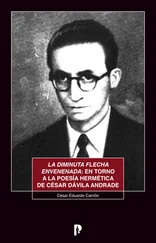The name, which didn’t mean anything to me, roused my mother out of her silence. Delia Martínez, the one who’s married to Liuzzi? The one who lived on the Boulevard? Yes, that’s the one. I noticed that habit of calling women by their maiden names: it was like constantly bringing up people’s histories. Mother said she had run into her the day before and had heard all about her agonizing ordeal with the statue… My friend interrupted her: that was precisely what had contaminated her sage plants, and her other herbs, and the whole garden. They explained — taking for granted that I didn’t know — that this woman lived in front of the small plaza along the Boulevard, where for months a sculptor had been working on a monument commissioned by the city. The marble dust blew toward her house, forcing her to live with her doors and windows hermetically sealed, and covered every last leaf in her garden, which was her great passion and her life’s masterwork. She’d complained to the mayor and on the local radio and television stations. Looking worried and peering down at her half-eaten dinner, Mother said that marble dust was very bad for your health. That was news to me, and it sounded like nonsense, so I started to say something, anything that would serve as an excuse for my friend in case he had used that sage, but he was already emphatically agreeing with her: it was the worst thing in the world, a poison, it could even kill you. And he should know, because of his profession. Of course he hadn’t taken sage from Delia’s garden! Anyway, she never would have given him any under those conditions. No, the sage that flavored the rice we were eating came from elsewhere. Delia Martínez herself had referred him on. The person with the sage was Mrs. Gardey, the owner of Pensión Gardey. A beauty! my mother exclaimed, and then she began, willy-nilly, to praise the woman, who, according to her, was still beautiful at ninety; in her youth she had been crowned Miss Pringles, and she was beautiful on the inside as well as on the outside: so good, kind, sweet, and intelligent — a real contrast to all the mean women in town. My friend nodded distractedly and ended the story by saying that when he went to see her, the old woman had greeted him by saying that she didn’t have any rooms available, that she was very sorry but the wedding of some French landowners had brought many people to town (some from France), and she was fully booked; when he explained why he’d come, she went to get some scissors, led him to her garden in the back, and cut him some sage, not without first offering him a “guided tour” of her establishment. My mother: the pension, it’s so beautiful, so well cared for, so clean, when she was young she always went to the carnival balls the late Mr. Gardey would organize. My friend corrected her: it wasn’t the same building… But Mother was sure of what she was saying, she argued with him forcefully, and enthusiastically elaborated upon her memories. But it simply wasn’t so, my friend knew exactly what he was talking about and silenced her with his own more precise information: the old Pensión Gardey, one of the most prominent buildings in town, had been demolished, and the current one — a much more modest and architecturally dull building — had been built on the same site. There was no question about the accuracy of what he was saying because there had been a trial that had reached epic proportions. It all happened when the owner of the adjacent lot, which was vacant, wanted to build. When he examined the maps in the lands registry, he discovered that the people who had built the pension had made a mistake and erected the dividing wall beyond the legal boundary, four inches into his — the neighbor’s — property. This was a serious problem: Gardey was not allowed to purchase that strip, usurped inadvertently, for land couldn’t be partitioned into plots less than a yard wide, and any offer of monetary compensation was contingent on the good will of the one accepting. There were arguments, misunderstandings, and the whole thing ended up in court; the neighbor was intransigent, and since the law was on his side, the pension, that fantastic Beaux Arts palace, the pride of the town and the site of the most wonderful memories for those who’d attended the grand carnival balls, had to be torn down — all because of four lousy inches! At this point, in the middle of the story, my friend stretched out his hand and held his thumb and index finger apart (four inches apart). This had been the ruin of Gardey, who was a good man; the neighbor was the bad one, all of Pringles blamed him. Gardey died soon thereafter, a bitter man, and it was his wife who rebuilt the pension and had been running it for the last several decades.
But to return to the toy with the blind doll, which he showed us after dinner: there were two cranks on the platform, one on either side. Did it still work? My friend said it did, perfectly, he had taken it out of the glass case so we could “watch the show.” It was almost a hundred years old, made in France; he wound it up every once in a while — not often because he cherished it as one of the crown jewels of his collection — setting it in motion so it wouldn’t rust. There were basically two mechanisms that had to function at the same time, that’s why there were two cranks. One was for the music box; the other controlled the automatons. A spring-loaded button in front guaranteed simultaneity. He pressed it, then proceeded to turn both cranks. They were two very small bronze “butterflies,” which he turned with the skill acquired through a lot of practice. His thick, rough fingers seemed unsuitable for such tiny devices, but they managed without a hitch. His hands were swollen and looked worn — the hands of a bricklayer. He had once told me that if he ever committed a crime, he wouldn’t have to worry about leaving fingerprints because working with bricks and mortar had erased them. I noticed that my mother was following these manipulations only out of politeness and with poorly disguised impatience. It’s not that she was a stickler for decorum, but she might have felt a bit intimidated. With a collector’s typical lack of sensitivity, my friend would never notice that she was wholly indifferent to his toys, and his pictures, and his objects. Perhaps even more than indifferent. Mother found them inexplicable, useless (they were, eminently), and therefore unwholesome. I realized that the lighting, which had been decreasing throughout our dinner, contributed to this feeling. We had eaten by candlelight, but afterwards, while wandering through the showrooms, I saw that the whole house was dimly lit. A few standing lamps in the corners, others on small tables and shelves, cast shrouded glows through their shades. My mother, my whole family, had always lived in interiors brightly lit either with bare bulbs, the strongest they had in the shops, or fluorescent tubes. I sensed that she found this system of discreetly and artistically placing lamps around the rooms somewhat suspect, like some kind of questionable symbol of social class. My friend, who, unlike us, came from the coarsest stratum of the proletariat, had embarked on a long and gradual process of refinement thanks to his contact with rich clients, whose houses he’d built. His antiquarian passions had done the rest.
Also, he traveled. Not on cultural trips or to study, but something must have stuck from his visits to the Old World. Like so many Italian immigrants, he had returned to visit his family as soon as he had the means to do so. His parents, who’d brought him to Argentina when he was an infant, had left a lot of relatives behind in Naples. He first went back when he was quite young, shortly after his parents died, and then he returned many times, accumulating vast European experience, from which he never stopped extracting facts and stories to spice up his conversation. During our dinner — not to go too far afield — he regaled us with several odd anecdotes. One of them came up in connection with diseases (my mother had mentioned, I don’t remember apropos of what, a neighbor’s health problems): his Neapolitan cousins, and perhaps, he deduced, all lower-class Neapolitans, concealed illness as if it were something shameful. One of his visits coincided with one of his aunts having minor surgery. They devised thousands of tricks to conceal it from him, which turned out to be not so easy. The closed doors, the sudden silences, the absences, the obvious lies (these people were very naïve), the conversations that stopped short whenever he entered, intrigued him, and in his efforts to figure out what was going on, he reached the conclusion that the Mafia had something to do with it. What else would entail so much secrecy? They had to get him out of the house on the day of the operation, and they did so on the pretext of taking him to see a cactus exhibition nearby, though not too nearby because the excursion had to last all day. He drove with his cousin and his whole family. The children, trained in finessing the deception, spent the whole trip babbling on and on with feigned excitement about cacti, as if going to see them was the fulfillment of their deepest longings. He wasn’t, of course, particularly interested in cacti, and the whole time he was thinking about how he was taking part in a Mafia operation that would leave a string of dead bodies in its wake. Even so, the exhibition turned out to be interesting. He remembered one of the cacti, very small and shaped exactly like an armchair, with many spines: it was called “mother-in-law’s rest.”
Читать дальше












